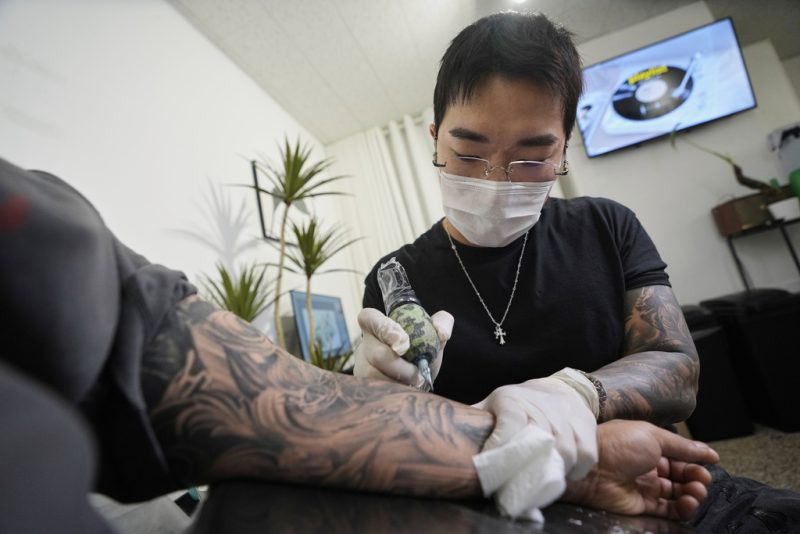Health
Understanding “Tattoo Flu”: Symptoms and Remedies Explored

The phenomenon known as “tattoo flu” can affect individuals following a tattoo session, particularly those undergoing larger or longer procedures. Characterized by a range of unpleasant symptoms, this condition is not an actual viral infection but rather a response from the body’s immune system to the stress of tattooing. Experts explain that reactions can vary significantly from person to person, with many reporting feelings of malaise after receiving ink.
What Is Tattoo Flu?
According to Mary Lupo, M.D., a board-certified dermatologist and adjunct faculty member at Tulane University, tattoo flu represents an immune response to the trauma of tattooing. “This absolutely happens,” she stated. “It’s very dependent on the individual and their sensitivity.” Larger tattoos tend to provoke a stronger reaction, and individuals may become more susceptible to this phenomenon after experiencing it for the first time.
Timothy Lebron, a tattoo artist at Bodiesneedrest and the HERE tattoo parlour in Brooklyn, has observed that even first-time clients frequently report symptoms associated with tattoo flu. “Plenty of people get hit with that foggy, feverish feeling after a tattoo,” he noted. “Your immune system kicks in, inflammation rises, and your stress hormones spike and then crash.” The experience has been likened to the aftermath of a hangover.
Recognizing the Symptoms
Those who experience tattoo flu describe symptoms that can include body aches, fever, chills, and nausea. A user on Reddit shared their experience, stating they felt “nauseous, hot, and exhausted,” while another commented on feeling “fever and horrible cold chills,” akin to being “hit by a truck.”
Jeff Garnett, co-founder of InkLess Tattoo Removal in New York City, recounted his own bout with tattoo flu after enduring two ten-hour sessions in 2020. He emphasized the reaction as a natural consequence of the tattooing process: “A metal needle going into your skin thousands of times” can understandably trigger a response from the body.
Interestingly, Garnett posits that some individuals may misinterpret their symptoms as tattoo flu while actually succumbing to common illnesses. As the immune system is preoccupied with healing, it may leave individuals vulnerable to other infections. “Your body can only handle so much,” he explained, which is why he avoids scheduling extended sessions for tattoo removals to prevent overwhelming clients’ immune systems.
Managing Tattoo Flu
To mitigate the effects of tattoo flu, experts recommend several strategies. Staying hydrated throughout the tattooing or removal process is crucial. Lebron advises clients to have a “good meal” and consume electrolyte-rich foods or beverages before and after their session. For those experiencing discomfort, Lupo suggests taking an anti-inflammatory medication.
“If it hits you, don’t panic,” Lebron cautioned. “Rest. Drink water. Eat something with salt and carbs. Take a warm shower. You’ll usually feel fine by the next day.”
Despite these potential reactions, many individuals report that they do not experience tattoo flu at all. A TikTok user humorously noted, “I didn’t even know tattoo flu was a thing lmao and I’m covered in them,” highlighting the variability in individual responses to tattooing.
Understanding tattoo flu can help individuals better prepare for their tattoo experiences and manage any symptoms that arise. As the popularity of tattooing continues to grow, awareness about this phenomenon becomes increasingly important for both artists and clients. By taking appropriate precautions and recognizing the signs, those considering tattoos can approach the process with greater confidence.
-

 World3 weeks ago
World3 weeks agoGlobal Air Forces Ranked by Annual Defense Budgets in 2025
-

 World3 weeks ago
World3 weeks agoMass Production of F-35 Fighter Jet Drives Down Costs
-

 Science3 weeks ago
Science3 weeks agoTime Crystals Revolutionize Quantum Computing Potential
-

 World3 weeks ago
World3 weeks agoElectrification Challenges Demand Advanced Multiphysics Modeling
-

 Top Stories3 weeks ago
Top Stories3 weeks agoDirecTV to Launch AI-Driven Ads with User Likenesses in 2026
-

 Lifestyle3 weeks ago
Lifestyle3 weeks agoDiscover Reese Witherspoon’s Chic Dining Room Style for Under $25
-

 Top Stories3 weeks ago
Top Stories3 weeks agoNew ‘Star Trek: Voyager’ Game Demo Released, Players Test Limits
-

 Entertainment3 weeks ago
Entertainment3 weeks agoFreeport Art Gallery Transforms Waste into Creative Masterpieces
-

 Business3 weeks ago
Business3 weeks agoGold Investment Surge: Top Mutual Funds and ETF Alternatives
-

 Health3 weeks ago
Health3 weeks agoGavin Newsom Critiques Trump’s Health and National Guard Plans
-

 Politics1 week ago
Politics1 week agoLanguage Evolution: New Words Spark Confusion in Communication
-

 Lifestyle3 weeks ago
Lifestyle3 weeks agoLia Thomas Honored with ‘Voice of Inspiration’ Award at Dodgers Event









